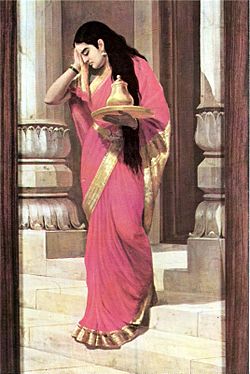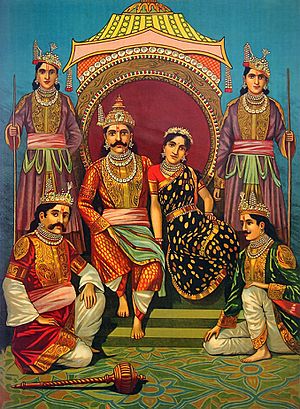Draupadi facts for kids
Quick facts for kids Draupadi |
|
|---|---|
| Member of Panchakanya | |

Draupadi, painted by Raja Ravi Varma
|
|
| Other names |
|
| Affiliation |
|
| Texts |
|
| Gender | Female |
| Personal information | |
| Born | Panchala |
| Died | Himalayas |
| Spouse | Pandavas |
| Children | Sons
|
| Parents |
|
| Siblings |
|
| Dynasty | Kuru dynasty by marriage |
Draupadi (Sanskrit: द्रौपदी, romanized: draupadī, lit. 'Daughter of Drupada') is a very important character in the Hindu epic story, Mahabharata. She is also known as Krishnaa, Panchali, and Yajnaseni. Draupadi is married to the five Pandava brothers: Yudhishthira, Bhima, Arjuna, Nakula, and Sahadeva.
The Mahabharata describes Draupadi as very beautiful. She had a dark skin tone, eyes like lotus flowers, and dark, curly hair. She was also known for her bravery and courage.
In the Mahabharata, Draupadi and her brother, Dhrishtadyumna, were born from a special fire ceremony called a yajna. This ceremony was arranged by their father, King Drupada of Panchala. Arjuna won Draupadi's hand in marriage in a contest. However, due to a misunderstanding by their mother, Kunti, Draupadi ended up marrying all five Pandava brothers. Later, she became an empress when Yudhishthira became the emperor. She had five sons, one with each Pandava brother. These sons were called the Upapandavas.
Contents
Draupadi's Marriage Story
News of Draupadi's beauty spread far and wide. Many princes and people traveled to Panchala to see her. The Pandavas, who were five sons of King Pandu of Kuru, also went to Panchala with their mother, Kunti.
The Pandavas heard about a special contest in Panchala. The winner would marry Draupadi. The contest was about archery skills. Arjuna, who was an amazing archer, entered the competition and won.
When the brothers brought Draupadi home to their mother, they joked. They told Kunti they had brought "excellent alms" (a gift). Kunti was busy and replied without looking. She told her sons to share the "alms" equally among them. Even though it was a mistake, the Pandavas always obeyed their mother. So, they agreed to share Draupadi, and she married all five brothers.
Draupadi had a son with each Pandava brother. These sons were called the Upapandavas. Their names were Prativindhya (son of Yudhishthira), Sutasoma (son of Bhima), Shrutakarma (son of Arjuna), Shatanika (son of Nakula), and Shrutasena (son of Sahadeva).
Later, the Pandavas built a city called Indraprastha. This happened after the Kuru Kingdom was divided to avoid fights over who would rule. Their cousins, the Kauravas, ruled the other part of the kingdom. But the Pandavas lost their kingdom to Duryodhana, the eldest Kaurava, in a game of dice.
The Game of Dice
A very important event in Draupadi's life was a game of dice played in Hastinapur. This story is not in the oldest versions of the Sanskrit epic.
The legend says that Duryodhana, the prince of the Kuru Kingdom, was jealous of the Pandavas' success. He wanted to take their kingdom. With help from his uncle, Shakuni, he planned to invite the Pandavas to Hastinapur. There, he would try to win their kingdom in a game of gambling. Shakuni had special dice that always did what he wanted.
Yudhishthira could not refuse the invitation because of royal rules. He gambled away his entire kingdom, his wealth, his four brothers, and even his wife, Draupadi. He kept gambling, hoping to win back what he lost. Draupadi was shocked to hear she was now a servant to Duryodhana. She bravely questioned if Yudhishthira had the right to lose her, since he had lost himself first.
Duryodhana then ordered his brother, Dushasana, to bring Draupadi into the court. Draupadi prayed to Krishna for help. When Dushasana tried to humiliate her, Krishna miraculously protected her. No matter how much fabric Dushasana unwrapped from her sari, there was always more.
Queen Gandhari, Duryodhana's mother, then stepped in. She was worried about what the Pandavas and their friends might do. She told Dhritarashtra to undo his sons' bad actions. So, everything Yudhishthira lost was given back.
However, the game was played again. This time, Shakuni set a condition: if Yudhishthira lost, he and his brothers would have to live in exile in the forest for thirteen years. The last year had to be spent in secret. If they were found, they would have to repeat the exile. The Pandavas lost again and began their exile.
After their exile, the Kurukshetra War happened. In this war, Draupadi lost her father, brothers, and her five sons. After the war, she was empress for 36 more years. Then, she and her husbands went to the Himalayas to live out their final days.
Draupadi's story has inspired many artworks, plays, and books. In Hinduism, she is seen as one of the panchakanya ("five respected women"). Their names are believed to help remove bad deeds when spoken. In some parts of India, people worship Draupadi as a goddess.
Draupadi in Books and Plays
Draupadi has been a topic of discussion and study for a long time. Many plays and novels have been written about her.
- Yajnaseni by Pratibha Ray – This novel was first written in Oriya language. It won a big award called the Jnanpith Award. It has also been translated into many other languages.
- The Palace of Illusions: A Novel by Chitra Banerjee Divakaruni – This book tells the whole Mahabharata story from Draupadi's point of view. It focuses on her feelings.
- Draupadi by Yarlagadda Lakshmi Prasad – This Telugu novel also tells the Mahabharata from Draupadi's perspective. It won a Sahitya Akademi Award.
- Nathabati Anathbat by Shaoli Mitra – This is a stage play. It shows Draupadi's sadness as a woman who "has five husbands, and yet none to protect her."
Images for kids
-
Reclining Draupadi's head – near Auroville.
See also
 In Spanish: Draupadi para niños
In Spanish: Draupadi para niños
 | Jewel Prestage |
 | Ella Baker |
 | Fannie Lou Hamer |










